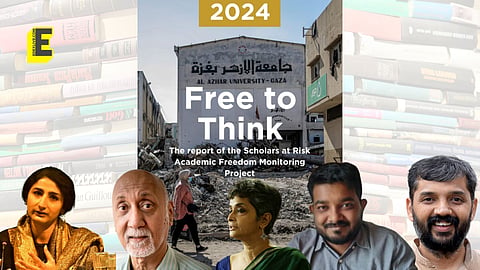

Prof Sabyasachi Das, Ashoka University
Prof Deepak Malghan, Indian Institutes of Management (IIM) Bangalore
Prof Nitasha Kaul, University of Westminister
Prof Niveditha Menon, Jawaharlal Nehru University (JNU)
Prof Achin Vainaik, former Professor, Delhi University (DU)
What do these scholars and academics have in common?
All of them have faced backlash and persecution for their academic work and research over the past one year, as stated by the Free to Think 2024 report.
What else does this report say about the state of Academic Freedom in India?
The Free to Think report is published annually by Scholars at Risk’s Academic Freedom Monitoring Project.
The report examines various attacks on higher education communities around the world with the aim of promoting and protecting academic freedom.
According to this year’s report, India’s Academic Freedom Index or AFi dropped drastically over the last 10 years, from 0.6 in 2013, to 0.2 in 2023. This is the lowest that India’s academic freedom has ever been since the mid-40s.
Further, the report classifies India as “completely restricted” due to threats to academic freedom that included, “the ruling Bharatiya Janata Party (BJP)’s efforts to exert political control and impose a Hindu nationalist agenda over universities and university policies limiting student protest.”
The report makes a case of India’s dwindling academic freedom by mentioning several instances of institutional restrictions, backlash from political groups, and censoring of dissenting voices in Indian Academia.
For instance, the report mentions how both JNU and South Asian University announced new policies limiting student protests following a wave of student-led protests.
While JNU barred students from protesting near academic buildings, SAU admitted students to sign a 13-point pledge to refrain from protesting, agitating, or striking on campus, the report added.
The report also talked about how the Central Government, led by the Bharatiya Janta Party attempted to exert control on the functioning of State Universities through Governors.
These attempts have resulted in visibly ugly battles for control over higher education between the state governments and the governors — the most prominent of them being the spat between Kerala Governor Arif Mohammed Khan and the Communist Party of India-Marxist-led Kerala Government.
In addition to police action against student protests, the report also makes mention of instances of clampdown on individual academics. These include:
- Resignation of Prof Sabyasachi Das from Ashoka University following a paper published by him, which alleges political manipulation during the 2019 Lok Sabha elections
- Censure and eventual demotion of Prof Deepak Malghan by IIM Bangalore for his activism and criticisms of the institution's lack of diversity
- Restriction of Dr Nitasha Kaul from entering India, when she arrived in Bengaluru on the invitation of Karnataka Social Welfare Minister HC Mahadevappa to speak at a 2-day convention
- The heckling of a lecture delivered by Prof Nivedita Menon at Gangadhar Meher University on March 12, 2024, by members of the Akhil Bharatiya Vidyarthi Parishad, forcing the professor to leave early
The report also includes attempts to silence academics critical of Israel and its military aggression & occupation of Palestine, such as IIT Bombay cancelling a talk by Achin Vanaik on the history of the Israel-Palestine conflict on November 14, 2023.
This was after students alleged that Vainaik’s earlier talk at OP Jindal Global University, which drew parallels between the ideologies of Zionism and Hindutva, was “anti-Hindu”.
In addition, the Delhi University on April 2024 cancelled an event titled “Let Us Hear a Palestinian Word,” which was intended to feature Palestinian poetry and was approved by the administration. The event was cancelled two days prior to its date, with no explanation provided.
The report also mentions the police detainment of over 200 students from JNU, Jamia Milia Islamia and Delhi University when they protested in front of the Israeli Embassy in Delhi in solidarity with Palestine on October 23, 2023.
On the other hand, one positive development for academic freedom in India, as mentioned in the report, is the acquittal and release of scholar, writer and human rights activist Prof GN Sai Baba, who was imprisoned since 2014 for allegedly having connections with banned Maoist outfits in India.
The Scholars at Risk network is comprised of over 530 higher educational and academic institutions across 42 countries, that are committed to defend academic freedom and human rights of scholars across the world.
